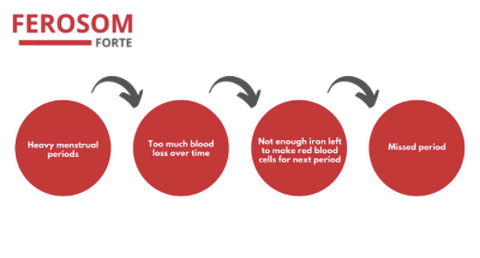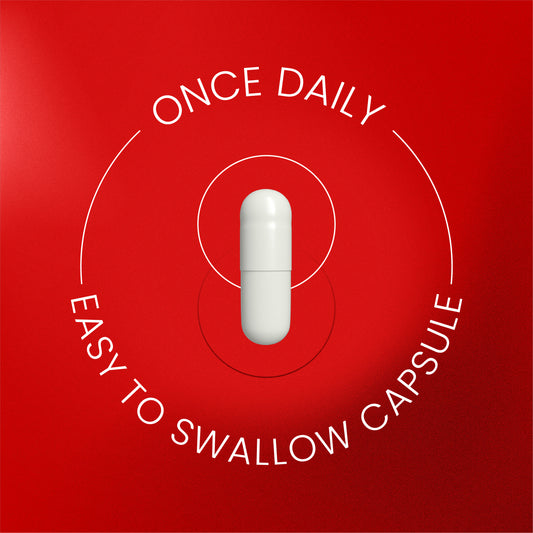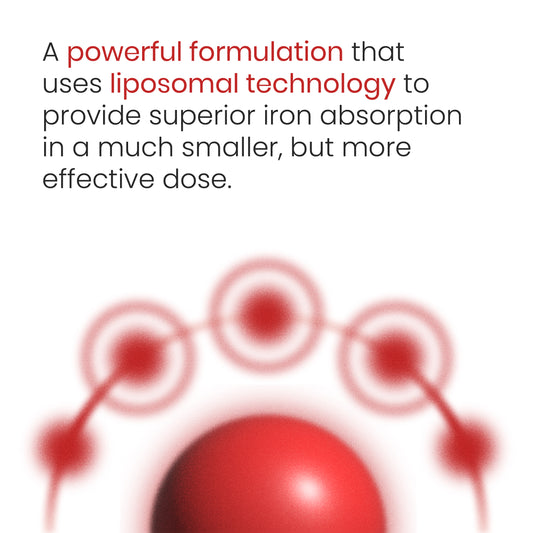

Ahh, the menstrual cycle rollercoaster… have you had just about enough of it? The monthly cramps and mood swings are enough of a challenge to deal with. But what happens when iron deficiency gets thrown into the mix too?
One of the biggest concerns the Ferosom Forte team hears from women is whether low iron can actually stop your periods altogether. You may have struggled with the likes of feeling faint, fatigued, or short of breath -- they’re all common (and annoying!) symptoms of period anemia and iron deficiency.
In this blog, though, we’ll specifically focus on the link between low iron and missed periods -- as well as what your options are to try to solve the issue.
So, the Big Question… Can Low Iron Stop Periods?
In a word... yes!
Heavy menstrual periods are the number one cause of iron deficiency in women. Dr. Jacques Moritz -- Director of Gynecology at Mount Sinai St. Luke's Roosevelt in New York City -- states that some women “lose too much blood, replace about half of it, and then lose too much again the following month."
When heavy periods repeat month after month, you may be more at risk of depleted iron levels. Around 70% of the iron in your body is found in hemoglobin -- a type of red blood cell that transports oxygen to your tissues. The trouble with excess blood loss through menstruation is that the iron can’t be replaced fast enough.
In turn, a vicious cycle can be created…Due to the blood lost from previous periods, there isn’t enough iron left to make sufficient red blood cells for your next period. Still with us so far? The biology behind this can get a little confusing, so don’t worry if this feels more like “huh” than “a-ha” so far. Here’s a graphic to make things clearer:

It’s worth noting that iron deficiency isn’t the only cause of menstrual changes, though. Many women jump to the conclusion that they must be pregnant if they miss a period but there are other potential factors to keep in mind, such as:
Birth control
- When you start a type of birth control (such as the pill or an IUD), your body needs time to adjust to the hormonal changes. This can lead to missed periods in the first few months.
Nutritional imbalance
- If you’re consuming too much alcohol, caffeine, or junk food, this can have an impact on your hormones. Period symptoms (e.g. feeling bloated, tender breasts, headaches) without menstrual blood flow may occur as a result.
Polycystic Ovary Syndrome (PCOS)
- 1 in 10 women of childbearing age has PCOS. The disorder results in hormonal imbalances that can interfere with ovulation. Apart from a missed period, other signs can include weight gain and excess hair growth.
Stress (physical or psychological)
- Stress is part of life -- we can’t avoid it entirely. But too much stress at once is a strain on the body. Levels of hormones such as estrogen and progesterone can be thrown off-balance when the thyroid, adrenals, or ovaries are put under chronic stress.
Too much exercise
- Exercise is great, of course, but in moderation! Frequent, high-intensity workouts can affect the hormones involved with menstruation -- particularly if you’re not getting adequate nutrition to match your exercise regime.
How Do I Know If I’m Losing Too Much Blood During My Period?
The most obvious sign that you’re losing too much blood during your periods is simple, really -- if your menstrual flow is heavier than normal, this could indicate that something’s wrong.
35-50 ml is the average amount of blood lost in a menstrual period. When the amount is over 80 ml (which 10% of women experience) this is classified as heavy menstrual bleeding -- otherwise known as menorrhagia.
Symptoms of menorrhagia to watch out for include:
- Bleeding for more than a week
- Blood clots that are bigger than a quarter piece
- Having to limit activities due to heavy menstrual flow
- Menstrual flow is only controlled by using double sanitary protection
- Regularly having to wake in the night to change tampon or pad
- Tampons or pads getting soaked through every hour
- Weakness, tiredness, or shortness of breath
Do Iron Pills Make Periods Lighter?
Iron pills don’t make periods lighter, but supplementation is still a sensible idea to replenish the iron stores in the body. Of 236 women treated for heavy menstrual bleeding, one year of iron supplementation increased their hemoglobin levels, reduced anxiety and depression, and improved their daily energy.
Before the year of iron supplementation, 60% of the women had severe iron deficiency and 27% were anemic (of which, iron deficiency is known to be the main cause). Surprisingly, though, only 8% of those with anemia at the start of the study were supplementing with iron. Why such a low figure, when sufficient iron levels are vital for making enough new red blood cells?
The gynecology researchers said in their study summary:
"A possible explanation for low supplementation is that clinicians focus solely on treatment of [heavy menstrual bleeding] itself, and may not pay specific attention to diagnosis and treatment of anemia and iron deficiency."
As always, we recommend you speak with your doctor to thoroughly investigate any excess bleeding you may experience during your periods. Once the cause has been established, you’ll be able to choose the best iron supplement for you.
How Can I Treat Iron Deficiency Anemia From Heavy Periods?
Anemia is a huge problem around the globe, with 24.8% of the world’s population affected (that’s 1.62 BILLION people!)
It goes without saying, then, that you’re not alone if you’re suffering from this. But what are your options in terms of treatment for iron-deficiency anemia?
First, we ought to warn you that the symptoms of period anemia aren’t always obvious -- they can sneak up over several months or years, rather than in a matter of days or weeks.
“Eat more meat” is the go-to piece of advice you’ll probably hear most often if you’ve missed periods due to a lack of iron. One of the best food iron sources is liver, but we realize that the taste isn’t for everyone!
Heme iron is only found in meat, whereas nonheme iron can be consumed from plant sources.
Here is a list of other recommended foods with high amounts of heme or nonheme iron:
- Beans
- Beef
- Beets
- Chicken
- Grains
- Kale
- Lentils
- Nuts (e.g. almonds, cashews)
- Seafood (especially shellfish)
- Tofu
Including more iron in your diet is a smart place to start, but it isn’t guaranteed to be enough to treat iron deficiency anemia. In such cases, oral iron supplements are typically the best treatment path to follow.
However, a drawback of iron supplementation is the side effects that can come with it... Women trying to ease the symptoms of heavy periods often report that iron pills cause a metallic taste, or even constipation.
If you’re on the lookout for a non constipating iron supplement that also provides better absorption, you may want to check out Ferosom Forte.
This iron supplement has been designed to treat iron deficiency anemia with both efficiency and comfort in mind. If you prefer your iron supplement in flavored form, these iron sachets have a refreshing berry taste and are packed with vitamins B6, B12, C, and D. Iron with vitamin c is known to help increase absoprtion and is a notable antioxidant that is key to include into your daily intake.
Summary
Many thanks for reading our article on iron deficiency and menstruation. Hopefully, you’ve found the answers you were searching for!
Feel free to scroll up to any of the four FAQs above to recap the information. The key sections of the article were as follows:
- Can low iron stop your period?
- Signs you’re losing too much blood during your periods
- Can iron pills make your periods lighter?
- How to treat iron deficiency anemia from heavy periods
Request a doctor consult if you’re concerned about low iron or missed periods.
To health and wellness,
Ferosom Forte






